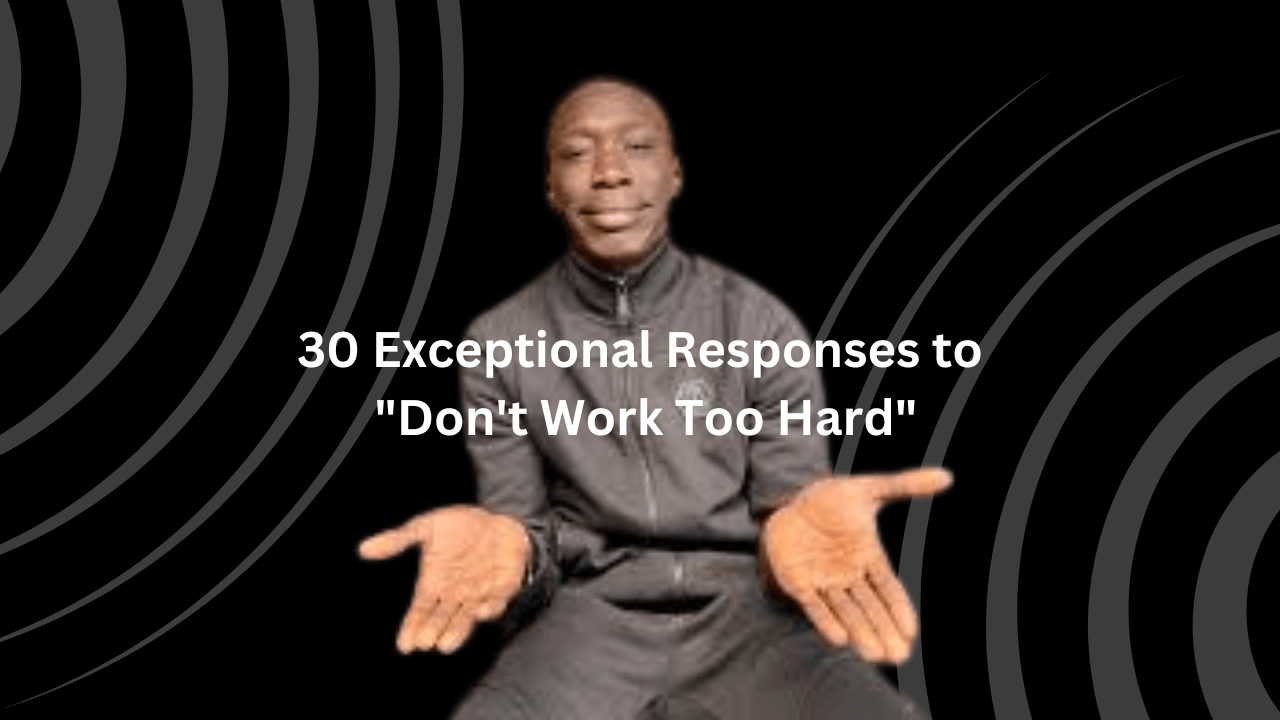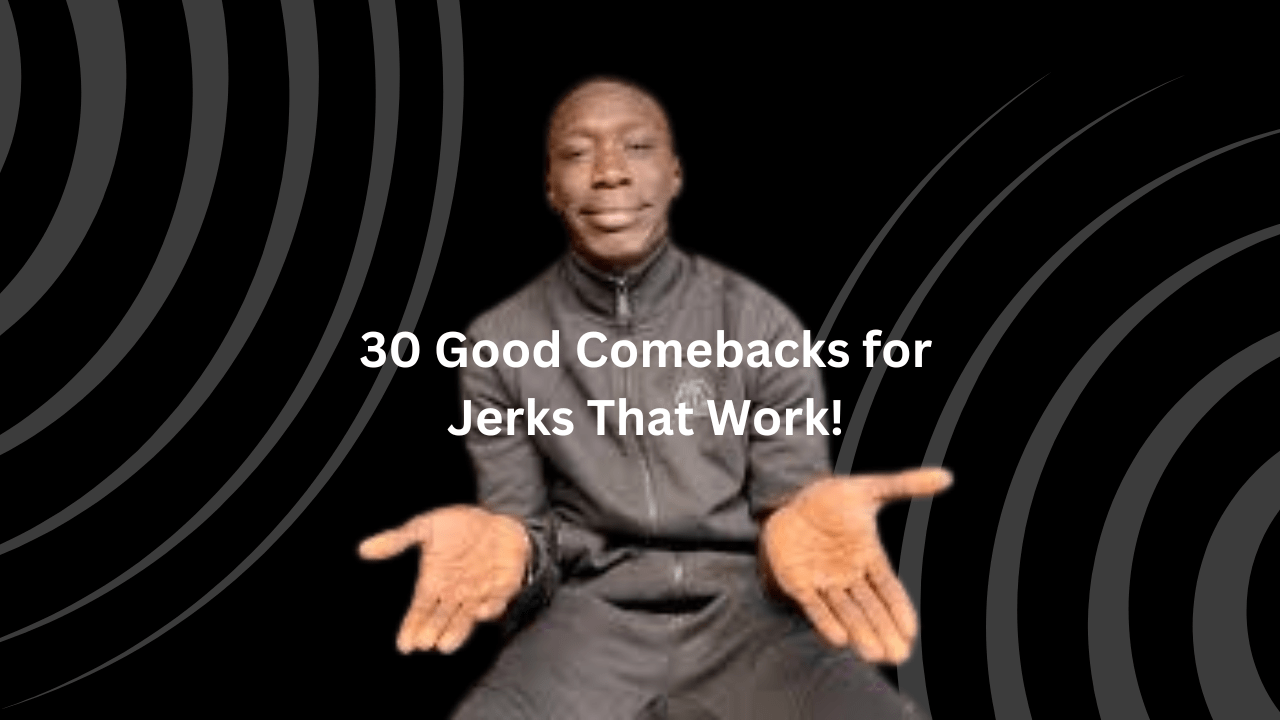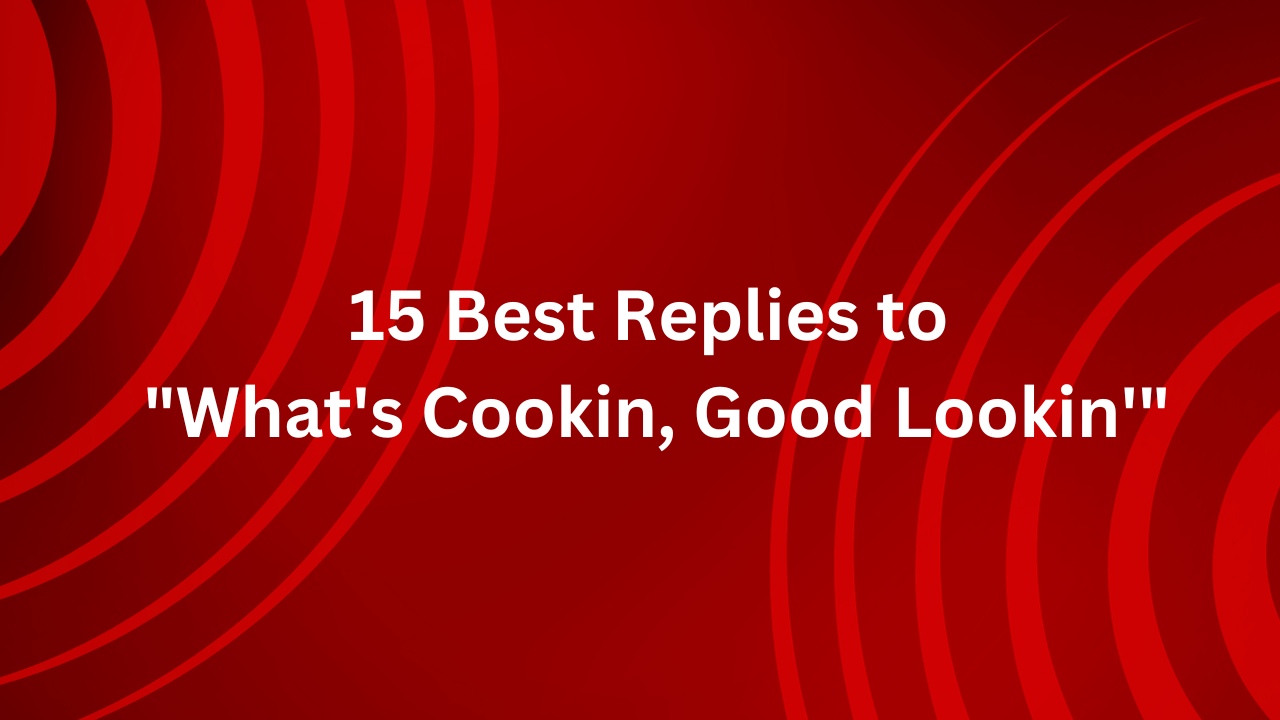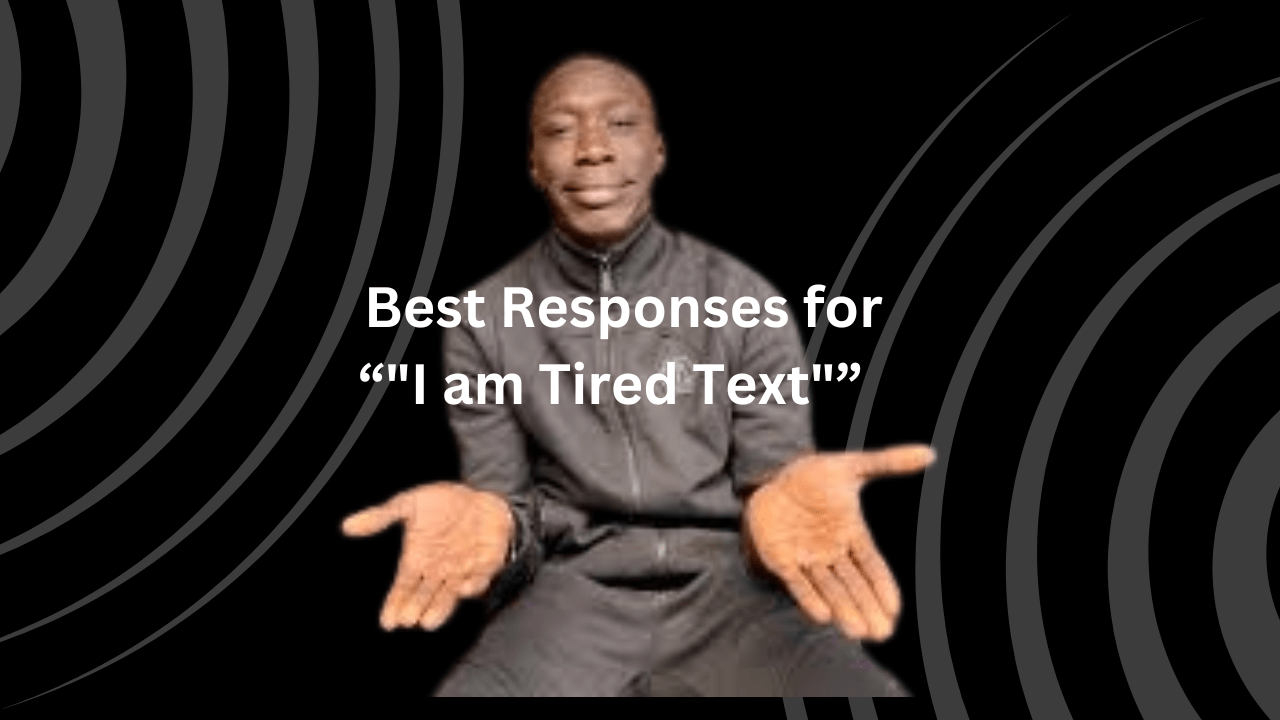In our fast-paced world, the phrase “Don’t work too hard” has become a common refrain in conversations. Whether it’s from a colleague, friend, or family member, this well-meaning sentiment carries with it a sense of care and concern. However, responding to such comments with creativity and warmth can elevate the interaction to something truly extraordinary. In this article, we’ll explore 30 exceptional responses to “Don’t work too hard,” empowering you to embrace the sentiment with gratitude, humor, and creativity.
Understanding the Context:

Before diving into the responses, it’s essential to understand the context in which the phrase is typically used. “Don’t work too hard” is often uttered as a form of encouragement or well-wishing, acknowledging the value of rest and self-care amidst the demands of work and life. Recognizing the underlying sentiment of care and concern is crucial in crafting thoughtful responses that resonate with sincerity and warmth.
Quick Tips for Responding Creatively:

Responding to “Don’t work too hard” with creativity and warmth can transform a routine exchange into a memorable moment of connection. Here are some quick tips for crafting extraordinary responses:
Acknowledge the sentiment: Express gratitude for the care and concern behind the comment.
Inject humor: Lighten the mood with a touch of humor or wit.
Personalize your response: Tailor your reply to reflect your personality and the nature of your relationship with the person making the comment.
Now, let’s explore 30 Extraordinary Responses to “Don’t Work Too Hard”:

“Thanks for the reminder! I’ll make sure to take a break and enjoy a cup of coffee…or two.”
This response expresses gratitude for the well-meaning sentiment behind the comment while injecting humor by suggesting indulging in a leisurely coffee break. It acknowledges the importance of balancing work with moments of relaxation.
“Don’t worry, I’ll save some energy for my next Netflix marathon.”
By humorously referencing a Netflix marathon, this response acknowledges the need for downtime and self-care. It implies that the individual will prioritize relaxation and leisure activities alongside their work responsibilities.
“Promise not to overexert myself…unless there’s cake involved.”
This response injects humor by playfully suggesting that the individual may be tempted to overexert themselves for the right incentive, such as cake. It lightens the mood while acknowledging the importance of moderation.
“I’ll try my best to balance hard work with hard relaxation.”
This response humorously juxtaposes “hard work” with “hard relaxation,” emphasizing the importance of striking a balance between productivity and leisure. It acknowledges the sentiment behind the comment while advocating for a holistic approach to well-being.
“I’ll take it easy, but only if you promise to join me for a leisurely lunch.”
By suggesting a leisurely lunch with the person making the comment, this response adds a playful element to the interaction. It implies that the individual values quality time spent with others and prioritizes social connections.
“I’ll make a deal with you: I won’t work too hard if you promise to share your secret for work-life balance.”
This response humorously challenges the person making the comment to share their own strategies for achieving work-life balance. It emphasizes the importance of mutual support and learning from others’ experiences.
“Don’t work too hard? Challenge accepted! Let’s see how many cat videos I can watch in an hour.”
By playfully accepting the “challenge” of not working too hard, this response injects humor into the conversation. It light-heartedly acknowledges the need for breaks and moments of leisure.
“I’ll take your advice and schedule a meeting with my couch.”
This response humorously suggests scheduling a “meeting” with the couch, implying that the individual plans to prioritize relaxation and downtime. It adds a whimsical touch to the conversation while emphasizing the importance of self-care.
“Rest assured, I’ll work smarter, not harder.”
This response reassures the person making the comment that the individual is mindful of their workload and productivity. It acknowledges the sentiment behind the comment while advocating for efficiency and effectiveness in work habits.
“Thanks for the reminder! I’ll make sure to pencil in some ‘me time’ on my calendar.”
By expressing gratitude for the reminder to prioritize self-care, this response acknowledges the importance of carving out time for personal well-being. It emphasizes the need for intentional planning and self-reflection in maintaining a healthy work-life balance.
“I’ll strive for a healthy work-life blend, with an extra sprinkle of relaxation.”
This response emphasizes the concept of a “work-life blend” rather than strict separation, suggesting that the individual aims to integrate work and leisure seamlessly. It acknowledges the sentiment behind the comment while advocating for a holistic approach to life.
“I’ll take breaks as needed…especially when the office snacks are calling my name.”
By humorously referencing the allure of office snacks, this response highlights the importance of taking breaks and indulging in small pleasures. It adds a lighthearted touch to the conversation while advocating for self-care and enjoyment.
“I appreciate the concern! I’ll remember to hit the pause button when needed.”
This response expresses gratitude for the concern behind the comment while affirming the individual’s commitment to self-awareness and self-care. It acknowledges the importance of recognizing one’s limits and taking breaks when necessary.
“I’ll make sure to recharge my batteries…preferably with a power nap.”
By humorously referencing a “power nap,” this response suggests that the individual values rest and rejuvenation as essential components of productivity. It acknowledges the importance of energy management and self-care in maintaining performance.
“Don’t worry, I’ll keep the coffee pot on standby for any emergency caffeine boosts.”
This response humorously acknowledges the potential need for caffeine to boost energy levels during periods of hard work. It adds a playful touch to the conversation while recognizing the importance of staying alert and focused.
“Thanks for the encouragement! I’ll strive for productivity without burnout.”
By expressing gratitude for the encouragement behind the comment, this response affirms the individual’s commitment to maintaining a healthy work-life balance. It acknowledges the importance of productivity while prioritizing well-being and sustainability.
“I’ll aim for a healthy balance of hustle and hygge.”
This response humorously juxtaposes the concept of “hustle” with “hygge,” a Danish term for coziness and contentment. It emphasizes the importance of balancing ambition with relaxation and comfort.
“I’ll take your advice and indulge in some guilt-free downtime.”
By accepting the advice to indulge in downtime without guilt, this response emphasizes the importance of self-compassion and self-care. It acknowledges the sentiment behind the comment while advocating for mental and emotional well-being.
“I’ll channel my inner sloth and embrace the art of leisure.”
This response humorously references the image of a sloth, known for its relaxed and leisurely demeanor. It emphasizes the importance of embracing moments of relaxation and unhurried pace in life.
“I’ll prioritize self-care as much as I do my to-do list.”
By equating self-care with the to-do list, this response emphasizes its importance as a non-negotiable aspect of daily life. It acknowledges the sentiment behind the comment while advocating for a proactive approach to well-being.
“I’ll take breaks as necessary…especially when the opportunity for a snack break arises.”
By humorously referencing the allure of snack breaks, this response highlights the importance of enjoying simple pleasures and moments of respite. It adds a playful touch to the conversation while advocating for self-care and enjoyment.
“I’ll make sure to clock in some quality ‘me time’ amidst the hustle and bustle.”
This response emphasizes the importance of carving out time for oneself amidst the busyness of life. It acknowledges the sentiment behind the comment while advocating for self-reflection and self-care.
“Thanks for the reminder! I’ll strive for progress, not perfection.”
By expressing gratitude for the reminder to prioritize progress over perfection, this response acknowledges the importance of self-compassion and growth mindset. It emphasizes the value of continuous improvement and learning.
“I’ll work diligently but won’t forget to stop and smell the coffee.”
This response humorously references the idiom “stop and smell the roses,” suggesting that the individual values moments of mindfulness and appreciation amidst work responsibilities. It adds a playful touch to the conversation while advocating for work-life balance.
“I’ll aim for productivity with a side of relaxation.”
By juxtaposing productivity with relaxation, this response emphasizes the importance of integrating work and leisure harmoniously. It acknowledges the sentiment behind the comment while advocating for a holistic approach to well-being.
“I’ll take your advice and schedule some time for a digital detox.”
This response acknowledges the importance of disconnecting from technology to recharge and rejuvenate. It emphasizes the need for boundary-setting and self-care in the digital age.
“I’ll make sure to recharge my batteries regularly…preferably with a power nap or two.”
By humorously referencing the idea of recharging batteries, this response emphasizes the importance of rest and rejuvenation for optimal performance. It adds a playful touch to the conversation while advocating for self-care.
“I’ll keep calm and carry on, with occasional breaks for tea and tranquility.”
This response humorously references the famous British motto “Keep Calm and Carry On,” suggesting that the individual values moments of tranquility amidst the demands of daily life. It adds a lighthearted touch to the conversation while advocating for self-care and relaxation.
“I’ll strive for a healthy work-life rhythm, with plenty of room for rest and rejuvenation.”
This response emphasizes the importance of maintaining a balanced rhythm between work and life. It acknowledges the sentiment behind the comment while advocating for a holistic approach to well-being.
“I’ll take your advice to heart and prioritize my well-being alongside my workload.”
By expressing gratitude for the advice and affirming the commitment to prioritize well-being, this response acknowledges the importance of self-care and balance. It emphasizes the value of integrating personal well-being into work priorities.
Tailoring Your Response:
When selecting a response, consider the nature of your relationship with the person making the comment and the context of the conversation. Tailor your reply to reflect your personality and the sentiment behind the phrase, whether it’s gratitude, humor, or a combination of both. Demonstrating warmth and sincerity in your response can foster genuine connections and meaningful interactions.
Importance of Appreciating Well-Meaning Comments:
Responding to “Don’t work too hard” with gratitude, humor, and creativity not only acknowledges the care and concern behind the comment but also fosters a culture of support and encouragement. By appreciating well-meaning gestures, we strengthen our connections with others and create a positive ripple effect in our personal and professional relationships.
Conclusion:
In a world filled with routine exchanges, embracing the extraordinary can transform ordinary interactions into moments of connection and joy. By responding to “Don’t work too hard” with gratitude, humor, and creativity, we not only acknowledge the sentiment behind the phrase but also foster genuine connections and meaningful interactions. So, the next time someone offers you this well-meaning advice, embrace the opportunity to respond with warmth, wit, and a touch of extraordinary flair.









